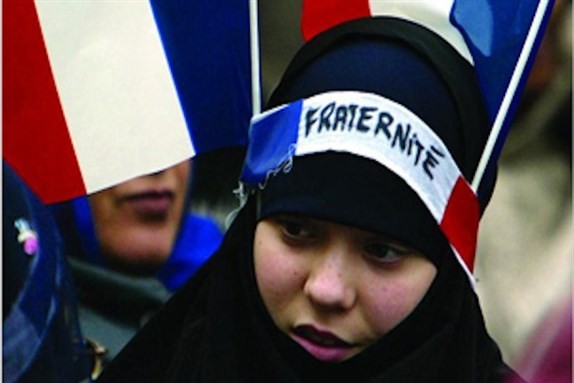In Confronting Extremism, France Risks Undermining Liberal Values

Lawmakers in France this week passed a sweeping new bill to combat “Islamist seperatism,” a form of religious extremism that President Emmanuel Macron has said poses a threat to French democracy by “claiming its own laws should be superior to those of the Republic.”
The legislation, entitled “The Law to Uphold Republican Principles,” comes shortly after a young terrorist beheaded French teacher Samuel Paty for displaying a caricature of Mohammed during a lesson on free speech. Paty’s brutal murder recalled memories of the shooting at French magazine Charlie Hebdo, just one in a deadly string of terrorist attacks from 2015 to 2018 which traumatized France and left 249 dead and 928 injured.
Macron claims the new law will prevent future attacks and facilitate the further integration of Muslim immigrants, many of whom now live in poor and insular neighborhoods. Yet though some of the bill contains reasonable measures to confront extremism—like criminalizing polygamy and forced marriage—other clauses have sparked intense debate.
One controversial article prohibits homeschooling for children over three years old, in an attempt to prevent radicalization at home or in underground religious schools. Another provision prohibits non-French citizens from leading French religious associations.
Yet perhaps the most contentious element of the new bill is an article obligating religious groups receiving state funds to sign and adhere to a “contract of Republican commitment” pledging loyalty to the principles of secular French society, including equality of the sexes. A religious group that refuses to sign may be investigated for supporting extremism.
Critics have called the contract “a veritable modern day patriotism test” that only serves to stigmatize believers, particularly Muslims. Yet supporters say the law is necessary to preserve the French ideal of laïcité, or secularism, and to counter illiberal ideas.
1. What is laïcité? And what is its history in France?
Though best translated as secularism, or “separation of church and state,” the French concept of laïcité differs from the American understanding of religious freedom. In the United States, the establishment clause prohibits the government from supporting any religion over another, but gives private citizens free range to practice their beliefs in private and public settings.
In France, laïcité is a much broader concept, with roots in the French revolution against the Monarchy and the Church. Valuing the secular political community above all, laïcité holds that there should be no religious influence on the public sphere, regardless of whether this influence comes from the state or from private individuals.
In recent decades, a wave of Muslim migration from former French colonies ignited a new debate on laïcité. In 2004, hijabs, crucifixes, yarmulkes, and other religious symbols were banned from public schools. And in 2010, France banned the full face veil in all public spaces. More recently, France passed a law penalizing religious groups and individuals promoting extremism, leading to the closure of almost 75 mosques and religious schools in 2020 alone.
2. What do critics of the law say?
Protests against the proposed legislation have spread across France and abroad, as many argue that it unfairly targets Muslims and violates democratic values.
Critics point to the European Convention on Human Rights, signed by France, which holds that “everyone has the right… to manifest his religion or belief, in worship, teaching, practice and observance.” Defenders of civil liberties worry that France is on a dangerous path towards regulating and punishing not just people’s actions, but also their thoughts and beliefs.
Apart from ideological objections to the law, there are strong indications that it simply won’t work to reduce radicalization. Many French Muslims are already marginalized and alienated from French society. Assimilation at the barrel of a gun might just exacerbate the problem. In recent months, some activists have called to replace the French focus on assimilation with a multiculturalist model for integration and acculturation closer to that of the United States.
Regardless of where you stand, one thing is certain: in its fight against extremism, France must be careful not to trample the very values and freedoms it seeks to preserve.



